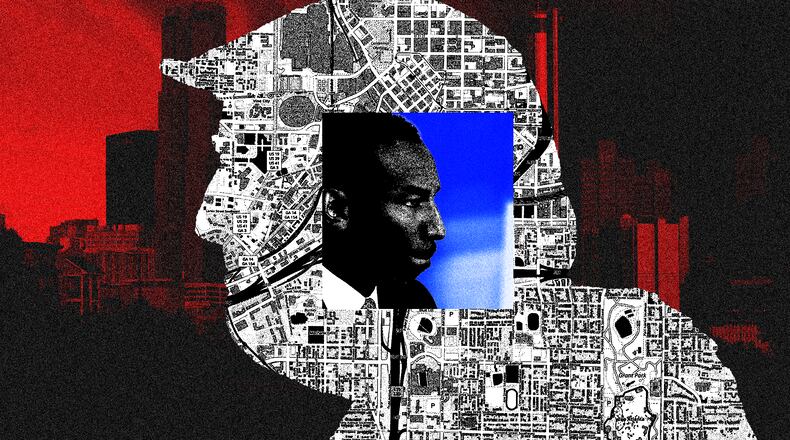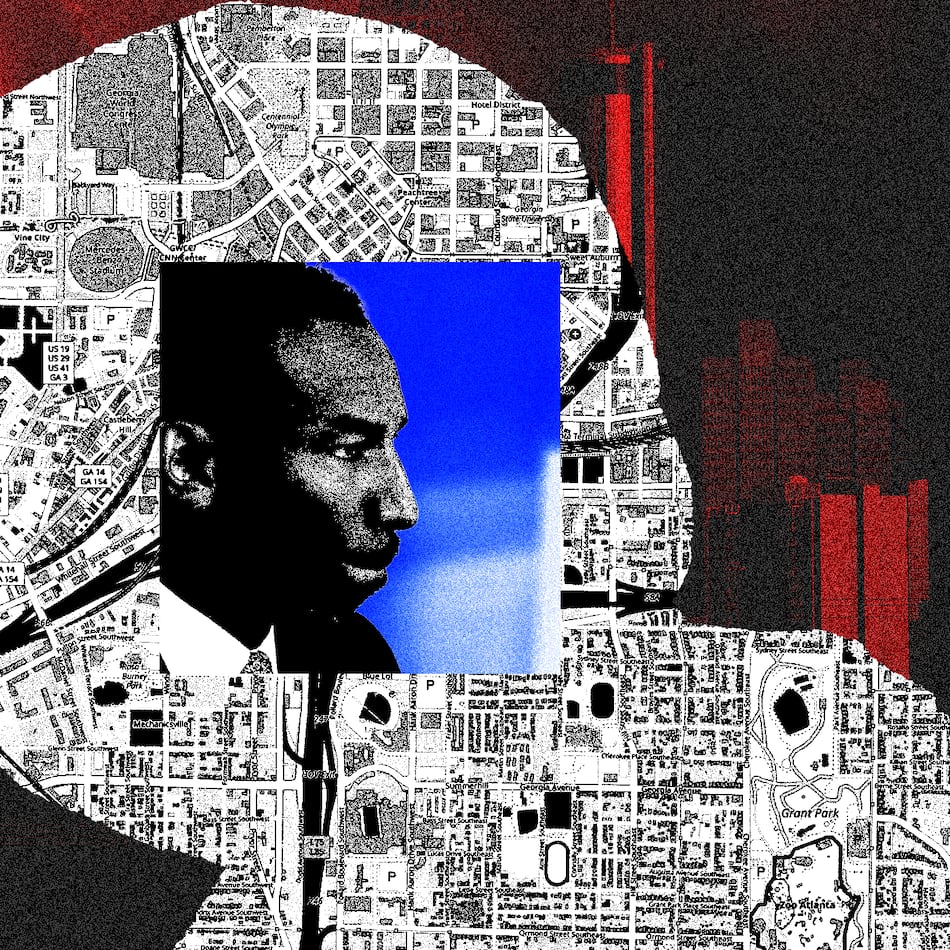President Donald Trump has deployed the military and other federal agents on city streets and threatened to withhold funding if city governments do not work with immigration enforcement agents.
But Atlanta — so far — has stayed out of his firing line.
During an Aug. 11 news conference in which Trump announced a federal law enforcement takeover of Washington, the president rattled off a list of other Democrat-run cities he has his eye on: Los Angeles, Chicago, New York, Baltimore and Oakland, California.
All are led by Black mayors in majority blue states.
Atlanta was not mentioned, even though it has been a prime target for Trump in the past. During his time in office, Trump labeled the city a “violent crime war zone” and “killing field.”
And when former Mayor Keisha Lance Bottoms was struggling to navigate nationwide calls for police reform, Trump and Atlanta’s leader publicly feuded over how to respond to mass protests in downtown. Their back-and-forth propelled Bottoms into the national spotlight.
More than six months into Trump’s second term, Mayor Andre Dickens is working to keep Georgia’s capital city off the president’s radar.
The mayor has held off almost entirely on commenting on many of the changes coming out of the White House. One exception came last week when Dickens held a news conference after qualifying for reelection.
“Washington, D.C.,” the mayor said, “has left the group project.”
“Federal dollars aren’t coming as easily as they did … during the Biden-Harris administration,” he said. “This new administration is not as favorable towards a lot of the programs that local communities are looking for.
“That means we got to look from within.”
Credit: Miguel Martinez-Jimenez
Credit: Miguel Martinez-Jimenez
Major federal cuts to affordable housing initiatives and ambitious infrastructure projects threaten many of the lofty goals that Dickens campaigned on and pursued since taking office in 2022.
Experts say the Trump administration’s relationships with local governments is unlike anything they’ve seen before.
“I can’t think of any time in my lifetime — or even longer — where we have seen such a degree of federal intrusion on the powers and authority of local governments,” Emory University political science professor Michael Leo Owens said.
The dynamic puts local elected officials in a tough position: If they speak out about the negative impacts of Trump’s policies, they risk retaliation.
Most experts agree that silence is the best way to keep Trump from turning on a city.
“I really think that the mayor is applying the correct strategy and staying fairly quiet about Trump,” said William G. Resh, chair of the Department of Public Management and Policy at Georgia State University’s Andrew Young School of Policy Studies.
With a consequential U.S. Senate seat up for grabs in 2026, Resh added, Trump is less likely to alienate voters he’ll need for Republicans to reclaim the seat.
“The mayor can also have some confidence in the fact that Atlanta as a target would be a very stupid move on behalf of the president,” Resh said.
But some of Atlanta’s elected officials speculate the city won’t escape Trump’s ire forever.
At a campaign event for Atlanta City Council President candidate Marci Collier Overstreet last week, state Sen. Nan Orrock told the crowd that the city needs strong leadership now more than ever.
“American cities are on the chopping block — (Trump) didn’t forget about Atlanta, he will come for Atlanta,” she said. “It’s only a matter of time.”
Credit: Arvin Temkar/AJC
Credit: Arvin Temkar/AJC
Swing-state protection
Vice President JD Vance visited Peachtree City last week to promote the president’s signature tax-and-spending law. When asked about a potential federal law enforcement takeover of Atlanta, he chose not to take aim at the city.
“What we’ve done is we have focused on Washington, D.C., because it’s a federal city under our jurisdiction,” he said. “But we certainly hope that — whether it’s Atlanta or anywhere else — people are going to look around and say, ‘We don’t have to live like this.’"
His response hinted that Republicans have decided to spare Atlanta for now even as they bash other cities.
Georgia was propelled to swing-state status when voters backed Joe Biden for president in 2020 at the same time they sent Democratic senators Jon Ossoff and Raphael Warnock to Congress. Resh said the state’s battleground standing is likely keeping Trump from adding Atlanta to his hit list of Democrat-run cities.
“He’d be fanning the flames to potentially mobilize voters who are against (Trump’s) policies,” Resh said.
Owens added there are other reasons Atlanta might escape Trump’s wrath — especially when it comes to a potential federal law enforcement takeover. Atlanta has taken significant steps to reduce crime.
Homicides have dropped under the Dickens administration, and the city recently celebrated the opening of its public safety training center meant to boost police recruitment efforts.
“Atlanta has the potential to end up being on the naughty list,” Owens said. “But I think there are reasons why Atlanta has yet to fall on that list.”
Dickens also has strong relationships with Georgia’s Republican state leadership. When first elected, he worked quickly to build an alliance with Gov. Brian Kemp, who sided with the mayor over the failed Buckhead cityhood effort.
Speaking out against Trump’s takeovers could strain that alliance with Kemp, who has in the past deployed National Guard troops to Atlanta.
‘A major shift’
Atlanta’s mayor has issued just one news release related to the impacts of federal policies — in January, when the Trump administration attempted to freeze housing money.
“The Dickens Administration calls on all White House decision-makers to immediately restore this funding for Atlanta and the entire region — and the families from all stations of life who will suffer the consequences,” the statement said.
But since, Dickens has only hinted at the uncertainty the Republican president has created for cities. Top mayor’s office officials say they remain focused on meeting the mayor’s goals without playing into the national debate over what’s happening in Washington, D.C.
“We’re going to meet 20,000 units of affordable housing and those other goals despite what the federal government is doing,” Courtney English, the mayor’s interim chief of staff, told The Atlanta Journal-Constitution.
Credit: Ben Hendren
Credit: Ben Hendren
Without a high-profile challenger in the November mayor’s race, addressing and explaining the detrimental impacts of the Trump administration on Atlanta’s progress may be Dickens’ toughest challenge.
It’s not just a reduction in federal funding at issue. Thousands of federal workers have lost their jobs at agencies like the Atlanta-based U.S. Centers for Disease Control and Prevention.
Even White House attacks on diversity and inclusion programs target minority contracting efforts like those that have grown Atlanta’s Black business community since Mayor Maynard Jackson in the 1970s.
“It is a major shift,” former Mayor Shirley Franklin said of the Republican administration and attacks on cities.
Franklin said local officials shouldn’t avoid talking to voters about the problems created by federal politics.
“You’ve got to tell a story of what you’re trying to do, how you’re trying to do it and why,” she said. “And you should be fully transparent about what the challenges are.”
Owens pointed out that “not all silence is the same.”
“I would call it stealth — where the idea is to move in silence,” he said. “Where you are being active, you’re being strategic, but you just don’t feel the need to draw lots of attention to what you’re doing.
“I would like to believe that is what Mayor Dickens is doing.”
About the Author
Keep Reading
The Latest
Featured







